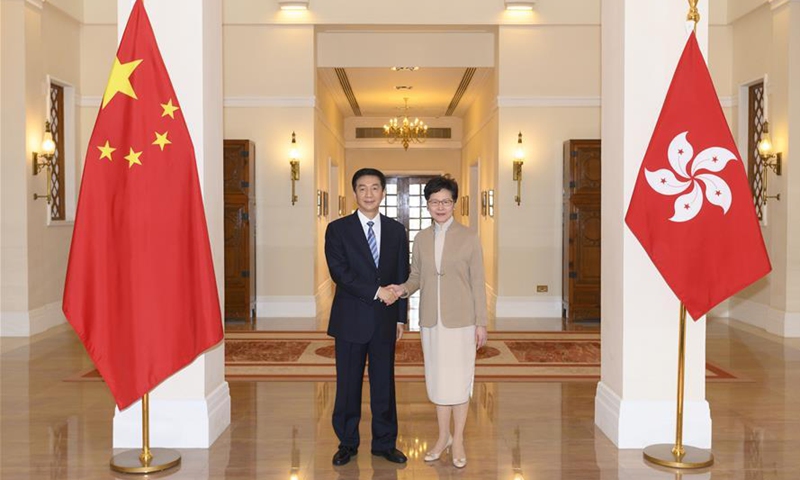HK officials more ‘politically mature, determined’ in face of foreign sanctions
By Zhang Hui Source: Global Times Published: 2020/8/18 20:48:40
Uphold national security despite personal attacks, foreign meddling: Lam

Chief Executive of China's Hong Kong Special Administrative Region (HKSAR) Carrie Lam meets with Luo Huining, the new director of the Liaison Office of the Central People's Government in the HKSAR in south China's Hong Kong, Jan. 9, 2020. Photo:Xinhua
Hong Kong Special Administrative Region (HKSAR) government officials have shown growing political maturity, more resilience and a firm stand in response to escalating personal attacks and political and financial pressure from Western countries and local extreme forces, since the implementation of the national security law for Hong Kong, analysts said.
Chief Executive Carrie Lam said on Facebook on Tuesday that the past year has been her toughest among her 40 years as a Hong Kong civil servant, with unprecedented personal attacks and days of deep concern, but that she will use the same fearless spirit to face these attacks.
"Those personal attacks have reached an international level amid the gross interference in Hong Kong affairs from foreign governments and politicians. But I will continue to uphold national security and the well-being of Hong Kong residents in the same fearless spirit," Lam said.
She quoted "Seun lau yik lau," a song by singer Paula Tsui Siu-fung to encourage herself.
"I will not let go no matter how hard it is, and I don't care about the provocations. I will only follow my heart," read part of the lyrics of the song.
Many Hong Kong officials and police officers have been threatened and bullied recently, especially after the national security law for Hong Kong was adopted in June.
Lam's Facebook post came after the US imposed economic sanctions on her and her colleagues over the law, and she admitted that the sanctions will bring some inconvenience in their use of credit cards, but that this is meaningless.
She said that she and her colleagues will not be intimidated, and that they felt honored to be trusted by the central government to enforce the legislation, Hong Kong media reported.
Lam also gave up her honorary fellowship at the Wolfson College of Cambridge University, as the college was under pressure to revoke her fellowship following the enactment of the national security law.
Some Hong Kong media predicted that Teresa Cheng Yeuk-wah would be next. Some British politicians have sent a letter to the University of London to revoke her honorary fellowship.
Tian Feilong, a legal expert on Hong Kong affairs at Beihang University in Beijing, told the Global Times on Tuesday that these threats, financial sanctions and pressure have turned into an opportunity for patriots of Hong Kong to take a second oath, and to force them to manage their interests and re-understand and recognize their identity and fundamental interests.
"Hong Kong civil servants could more accurately and comprehensively understand the 'one country, two systems' principle, be more steadfast in taking sides, and pay more attention to their identity facing the conflicts between their own country and Western countries," Tian said.
Their response to this pressure and sanctions shows that HKSAR government officials have become more politically mature, and realized that their responsibility to the rule of law and governance under the national security law and "one country, two systems" weighs more than their personal interests, Tian said.
He said that HKSAR officials may face more harassment and foreign sanctions over the national security law for Hong Kong as the law has directly hit home of local extreme forces and some foreign forces.
Just on Monday, the office of the Hong Kong chief executive received a letter containing an unknown white powder. Hong Kong police filed the case as a criminal threat.
Lam's surrender of her honorary fellowship set a fine example for other HKSAR officials, Tian said.
Local police forces should file an investigation in accordance with the national security law for Hong Kong on future means that threaten government officials and their families, and strictly punish those involved, Tian said.
Newspaper headline: HK officials mature politically amid sanctions
Posted in: POLITICS,HK/MACAO/TAIWAN